by Ken Sehested
Texts: Psalm 181-11; Habakkuk 1:1-11; Revelation 12:1-18
Sermon for the annual joint worship service of FOCUS, an ecumenical, congregationally-based community ministry, Albany, NY, 23 November 2003.
Earlier this fall I was asked to address a gathering of Christians on the of “peacemaking in a post-9/11 world.” Let me begin here as I did there, with a reminder of an earlier policy which has helped bring us to where we are—struggling for spiritual vision in a dark time. The “Kennan Doctrine,” as it is now called, was articulated in 1948 shortly after the very first use of weapons of mass destruction. It was written by George Kennan who directed the U.S. State Department’s planning staff and was later credited as the intellectual architect of the “Cold War” with the Soviet Union.
"We have about 50% of the world's wealth but only 6.3% of its population. This disparity is particularly great as between ourselves and the peoples of Asia. In this situation, we cannot fail to be the object of envy and resentment. Our real task in the coming period is to devise a pattern of relationships which will permit us to maintain this position  of disparity without positive detriment to our national security. To do so we will have to dispense with all sentimentality and day-dreaming; and our attention will have to be concentrated everywhere on our immediate national objectives….
of disparity without positive detriment to our national security. To do so we will have to dispense with all sentimentality and day-dreaming; and our attention will have to be concentrated everywhere on our immediate national objectives….
"We should dispense with the aspiration to 'be liked" or to be regarded as the repository of a high-minded international altruism. We should stop putting ourselves in the position of being our brother's keeper and refrain from offering moral and ideological advice. We should cease to talk about vague and–for the Far East–unreal objectives such as human rights, the raising of living standards, and democratization. The day is not far off when we are going to have to deal in straight power concepts. The less we are then hampered by idealistic slogans, the better."*
The Kennan doctrine is not this nation’s only doctrine, to be sure. There are others—more generous, more humane ones. But I am suggesting—and you must decide this for yourself—I’m suggesting that this doctrine of “straight power concepts” now dominates our body politic.
It is hardly a novel doctrine in human affairs. Way back when, the prophet Habbakuk complained loudly against those “whose own might is their god” (1:11). And he wept bitterly at the seeming indifference of Yahweh God: How long, O Lord, shall I cry to you, “Violence!” and you will not save.
How long, indeed?
A much more modern text, this one by G.K. Chesterton, says what I feel:
“I tell you naught for your comfort,
Yea, naught for your desire,
Save that the sky grows darker yet,
And the sea rises higher."
And the psalmist confirmed, in Eugene Peterson’s paraphrase: God has “wrapped himself in a trench coat of black-cloud darkness.” (The Message, Psalm 18)
How, then, are we to live? What silliness is it to speak of “seizing the night”? When the lights go out, is there anything but stumbling, bumbling, and crumbling, and wouldn’t it be better to cower in the corner?
§ § §
My friend J.C. came to town recently. It was good to catch up, over a dinner of tacos and beer. After comparing personal notes—we’ve both changed job descriptions since we last saw each other—we moved to topics more public, including national and international events.
“Politically speaking, I’m more pessimistic than I can ever remember,” I said, somewhat sheepishly, punctuating the comment with a long, mournful gaze in her direction.
Her face took a few seconds to respond, her words a few more. Finally, with an expression of one-part-alarm, one-part-pity, she said: “But this damned war has mobilized people like nothing I’ve ever seen. I’m on the road constantly now, doing nonviolence training, both in the church and with interfaith groups. People are open to this stuff like never before!”
She’s right, of course. For a split second I recalled finding hope while huddling around a short-wave radio in a Baghdad hotel room in mid-February. To get better reception, the radio was outside on the small balcony, in the hand of one of several members of the Iraq Peace Team. Several more of us were jammed near the doorway, craning our necks to catch the sound. The BBC broadcast was reviewing the astounding accounts from around the world of the February 15 marches protesting the war on Iraq—literally millions of people in hundreds of cities. “From Madagascar to Reykjavik,” I think I heard the news anchor report.
I cannot recall ever having such a viscerally jubilant response to a journalistic report. Truth is, I was scared. In an earlier group discussion many of us were beginning to feel the invasion was close. We knew full-well the implications of “shock and awe.” These reports, combined with the previous day’s account of Chief U.N. Weapons Inspector Hans Blic’s report—to the Security Council, casting further doubt on the U.S. Administration’s claims regarding weapons of 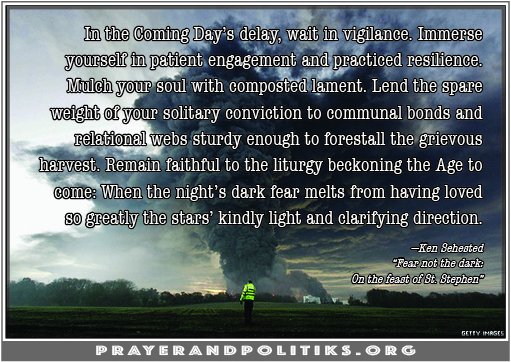 mass destruction—brought a measure of confidence that the invasion would be further delayed. The anti-war war movement was indeed mobilizing like never before.
mass destruction—brought a measure of confidence that the invasion would be further delayed. The anti-war war movement was indeed mobilizing like never before.
But the war came anyway.
Writing to the early Christian community at Corinth, the Apostle Paul penned these famous lines: “And now faith, hope and love abide, these three; but the greatest of these is love” (1 Corinthians 13:13).
Like Janet’s comment, this is also true. Love is the greatest. But hope may be the hardest.
§ § §
A simple recitation of current public malfeasance in public life is numbing. Just the highlights here at home include: the largest job-constriction rate since the Depression; the greatest income gap, between rich and poor, among all industrialized nations; nearly a fifth of our children living in poverty; a leap within three years from record federal budget surpluses to record deficits; public librarians fending off the reach of the Justice Department’s spying on book readers; the quadrupling of the prison population over the past two decades; over 40 million without health insurance; major assaults on environmental and civil rights accords. In my own state of North Carolina, a county prosecutor recently indicted a methamphetamine lab operator with two counts of manufacturing a weapon of mass destruction, courtesy of Congress’s new counter-terrorism legislation.
Globally, we’ve witnessed the current Administration’s dramatic withdrawal from a host of international treaties designed to abet environmental degradation, slow the development of advanced weaponry, and establish the rule of international law. By action of Congress in September 2002 we have in place a “National Security Strategy” which grants the Administration virtually unlimited war-making powers.
The level of public disingenuousness is such that Orwell himself would blush, as in U.S. Deputy Defense Secretary Paul Wolfowitz’s recent statement: "I think all foreigners should stop interfering in the internal affairs of Iraq."
Then there’s the chilling, hardly-noticed recent comment by an unnamed assistant to Defense Secretary Donald Rumsfeld, commenting on the reports of low U.S. troop morale in Iraq: "This is the future for the world we're in at the moment. We'll get better as we do it more often."
§ § §
Do you recall that Hagar the Terrible cartoon strip. In the first frame, Hagar and Lucky Eddie are caught in quicksand. “Don’t panic!” Hagar exclaims.
Second frame: They sink deeper.
Final frame: “Is it okay to be afraid?” Lucky Eddie asks.
If you’re not afraid, you’re not paying attention. If hope is to be had, it will come only in confrontation with clear-eyed assessment of the moment in which we live. This isn’t pessimism. It’s realism. Hope not grounded in reality is fantasy, wishful thinking.
After a recent visit to a seminary, one of the students—who engaged her studies after two years in post-war Bosnia—wrote a poignant follow-up letter:
"I wanted to ask you how you are able to live and work without becoming either (1) entirely cynical and jaded or (2) losing hope in what often seems to be a hopeless task. These weeks [following the U.S. attack on Iraq] have been very hard for me emotionally and mentally. In the midst of it, I ask myself continually: What is this that I've been called to? How am I going to be able to bear it? Is the rest of my life going to feel this heavy and heartbroken? To not be heartbroken would signal a loss in compassion and identification with the suffering, which would be antithetical to [my] calling. Yet, shouldn't there be some level of differentiation that has to come with this work in order to stay healthy and focused without losing heart or hope. Have you any words regarding this?"
Her question is as serious as a scalpel perched across the jugular. What words are sufficient? Will cheery ones—full of bravado and solidarity, spoken enthusiastically, pragmatically—fill the bill?
I say no, they won’t. But it would be a mistake to jump to the conclusion that my advocacy for how we face this perilous season is a uniform call to inwardness (if not outright quietism and passivity). Among my fundamental convictions are these: that people of faith are saved for the world, not from it; that the Spirit traffics in earthly affairs; that the order of redemption and liberation—the healing of creation itself—is governed by power, a power available to but not controlled by us. With Hannah Arendt I believe that power and violence are inimical, that while violence can destroy power, it can never generate power.
In order to generate power, however, more is asked of us than moral heroism; more than brilliant analysis; more than indefatigable energy. Insistent and anxious calls simply to work and think harder and longer—absent a 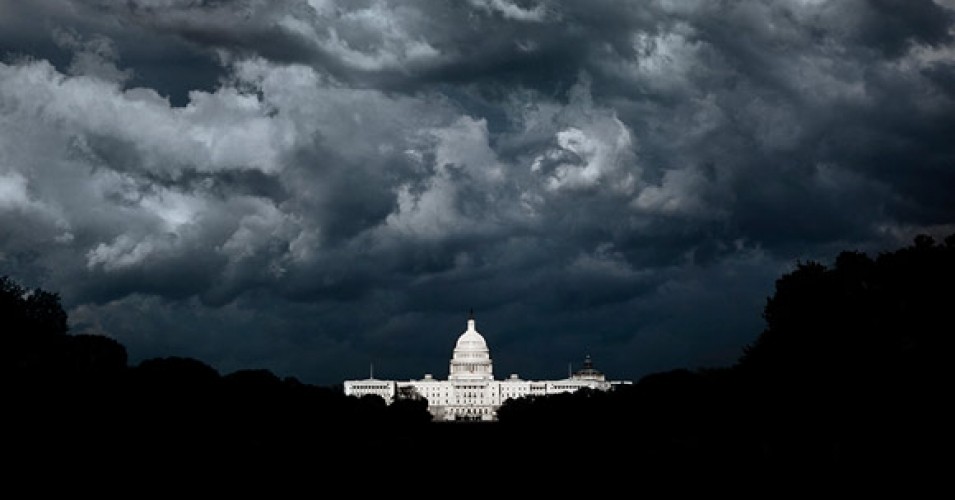 simultaneous commitment to the process of spiritual formation—only compound the crisis. Doing so has the effect of feeding our children to the very beast whose appetite swells with every fare. If our political vocation lacks anchorage in spiritual transformation, then we can only expect more of the same, only worse. You know what they say about computers: garbage in, garbage out.
simultaneous commitment to the process of spiritual formation—only compound the crisis. Doing so has the effect of feeding our children to the very beast whose appetite swells with every fare. If our political vocation lacks anchorage in spiritual transformation, then we can only expect more of the same, only worse. You know what they say about computers: garbage in, garbage out.
§ § §
“To know the dark, go dark. Go without sight,
and find that the dark, too, blooms and sings,
and is traveled by dark feet and dark wings.” (Wendell Berry)
“But the dark embraces everything:
shapes and shadows, creatures and me,
people, nations—just as they are.
It lets me imagine a great presence stirring beside me.
I believe in the night.” (Ranier Maria Rilke)
“Then the people stood at a distance, while Moses drew near to the thick darkness where God was.” (Exodus 20:21)
§ § §
Our sacred text is filled with apparent ironies: relinquishment as the means of true possession; strength flowing from weakness; silence giving birth to authentic speech; life emerging from the ash heap. For those of us attempting to find a way in this dangerous time—to traverse this seemingly endless graveyard with something more than a whistle on our lips—embracing the reality of darkness, rather than fleeing it, is crucial to the sustenance of hope.
As filtered through Western intellectual and cultural traditions, the Bible—Christian Scripture—appears to have a pronounced bias favoring “light” and opposing “darkness.” Surely there is plenty of evidence to justify such bias. But another reading is also possible, one more pronounced in Christian mystical traditions, where the Holy One is encountered in darkness.
Indeed, the opening chapter of Genesis affirms that creation begins in darkness: “And there was evening and there was morning, the first day” (1:5). The promise to Abram, of descendants outnumbering the stars and of land (read security) is made only after a “deep and terrifying darkness descended upon him” (15:12). It was again at night when the promise was renewed with Abram’s son, Isaac (26:24). And Isaac’s son, Jacob, has his name changed (read destiny) to “Israel” (“one who strives with human and divine beings”) following an all-night wrestling match with an “angel” (32:24-32).
The Hebrew slaves’ escape from Pharaoh’s prison camp occurred at night; and, a little later, their covenant-making encounter with God comes from “the voice out of the darkness” (Exodus 20:21; Deuteronomy 5:22). Indeed, “The LORD has said that he would reside in thick darkness” (1 Kings 8;12; 2 Chronicles 6:1), and God “made darkness his covering around him” (Psalm 18:11). The repeated promise of good news is “to those who sat in darkness . . . for those who sat in the region and shadow of death” (Isaiah. 9:2; Matthew 4:16). To these faithful ones “the treasures of darkness” are promised (Isaiah 45:3).
Then, of course, there’s the unforgettable image from Psalm 23: “Yea, though I walk through the valley of the shadow of death, I will fear no evil.”
The Jesus story begins with angels appearing in the dead of night to roughneck shepherds. Royal astrologers from the East are alerted to divine announcement by stars visible only in darkness. Joseph, Mary and the infant flee the wrath of political authorities under cover of night.
Jesus’ well-known statement about being “born again” (more accurately, “born from above”) was made to the Jewish leader Nicodemus, who came under the cover of darkness for a rendezvous with Jesus. It was at night—“on the night he was betrayed” (1 Corinthians 11:23)—that Jesus gathered his disciples for a final meal and parting instructions.
On more than one occasion Jesus’ imprisoned followers received nighttime angelic visitation, either to free them (Act 5:19) or to bolster their courage for a coming trial (18:9). And the Apostle Paul’s initiation of his historic mission to  Gentiles came on the heels of another night vision, of a “man from Macedonia pleading with him and saying, ‘Come over to Macedonia and help us’” (16:9). The tradition continues—especially in works like St. John of the Cross’s Dark Night of the Soul—up through modern poets like Rilke and Berry.
Gentiles came on the heels of another night vision, of a “man from Macedonia pleading with him and saying, ‘Come over to Macedonia and help us’” (16:9). The tradition continues—especially in works like St. John of the Cross’s Dark Night of the Soul—up through modern poets like Rilke and Berry.
What might happen if we allowed the realism of our present predicament to embrace this spiritually-forming “night” life? What if—instead of manic attempts to suppress our anxiety and flee our despair—we take this invitation to embrace what Rilke, in his Letters to a Young Poet, called “sadness.”
"It seems to me that almost all our sadnesses are moments of tension, which we feel as paralysis. . . . Because we are alone with the unfamiliar presence that has entered us; because everything we trust and are used to is for a moment taken away from us. . . . And that is why it is so important to be solitary and attentive when one is sad. . . . The quieter we are, the more patient and open we are in our sadnesses, the more deeply and serenely the new presence can enter us, and the more we can make it our own. . . .”
His comments remind me of a phrase by German theologian Dorothee Sölle’s, when she urged schooling in the capacity for “revolutionary patience.” Patience, not as passivity or idleness, but active, on-the-edge-of-your-seat waiting and listening. Patience like stubborn resistance. Like a good farmer who knows when to plant, when to plow, when to water, when to weed—and when to wait. “Harvest will fill the barn,” Wendell Berry writes in one of his Sabbath poems. “For that the hand must ache, the brow must sweat. Yet no leaf or grain is filled by work of ours. The field is tilled, and left to grace.”
Rather than give in to despair, to hopelessness, to withdrawal into the private life of resignation, what if we were to reclaim the literature of lament in our own Scripture? What if we stopped boycotting those angry imprecatory Psalms, giving voice to the anguish we feel? What if we threw off prayer as polite deference to a remote but fickle deity and allowed prayer instead to explore the raw edges of our agony?
What if we were to challenge our young people with the question, “For what are you willing to give your life? And then supported them, even in their trials and errors, in finding avenues to express their thirst for God? And what if we dared our old ones to resist our culture’s recommendation that they fill their lives with post-retirement distraction—dared them to reclaim their visionary vocation.
And what if, in the mist of our young ones dreaming and our old ones seeing visions, what if all of us could move beyond the tired old arguments between liberals and conservatives over whether the Bible is infallible or literally true and rediscovered the very real power of the text to form and inform our lives?
What we gathered around our baptismal pools and fonts to interrogate ourselves again with the question: What does it mean to be buried with Christ? What if, in the words of Clarence Jordan, we talked about faith not as belief in spite of the evidence but faith as life lived in scorn of the consequences?
What if we affirmed that the only serious thinking about Jesus is done on the road, in the midst of the risk of discipleship?
In that powerfully evocative scene from John’s wild imagination, he writes: “Then the dragon was angry with the woman, and went off to make war on the rest of her children, those who keep the commandments of God and hold the testimony of Jesus” (12:17). The dragon is still angry; and, yes, the war continues.
These indeed are the facts. But as Wendell Berry wrote: Be joyful, though you have considered the facts! As odd as it may sound, this sermon really is about Thanksgiving.
Years ago, when my wife pastored in Atlanta, she made regular visits with people in our congregation’s poverty-stricken neighborhood. Miss Eula May was among her favorite stops.
One of those visits was in the dead of winter, with cold, howling winds. Nancy went to check on Miss Eula May, a frail, older woman, whose only family was a son in prison and had long ago forgotten the womb from which he had emerged. Eula May’s house wa s a ramshackle structure, long since forgotten by the landlord. Her only source of heat was one small gas heater, and she spent frigid days sitting next to it, wrapped in a blanket.
s a ramshackle structure, long since forgotten by the landlord. Her only source of heat was one small gas heater, and she spent frigid days sitting next to it, wrapped in a blanket.
Eula May was dying, and she knew it. The fatal diagnosis of cancer was a daily companion. Before she left, Miss Eula May asked my wife to pray with her. And Nancy began a prayer for strength, for perseverance, for sustenance, for courage in the face of calamity. And Eula May began chiming in, almost inaudibly at first, with her voice finding unknown clarity and unparalleled resonance. Nancy says it was as if she was chanting—over and over, this simple phrase: “Oh, thank ya’ Jesus. Thank ya’ Lawd. Oh, thank ya’ Jesus, thank ya’ Lawd.”
She later related the story to me. “Here I was. A young, confident white woman trying to instill hope in a nearly-forgotten, penniless, terminal old black woman. And I realized the tables were turned. Miss Eula May was the one doing the installation that day; she was the one who knew about hope; hers was a heart of joy, filled with the kind of gratitude that only comes when the myth of privilege and false security is stripped away, filled with the hope that knows that only God and God’s purposes can be counted on.
Be still . . . fear not . . . know that I am God. These phrases are the consistent refrain in moments of deadly crisis throughout Scripture. They are always spoken to people with their backs against the wall, to those at the end of their rope, to the outnumbered, the outgunned, to those about-to-be-overwhelmed. They are not escape clauses to life’s apparent death knell. Rather, they are invitations to grasp that which is available only to those with empty hands.
It is to the mournful that rejoicing is promised; it is only to those facing trial that the Spirit’s presence is promised; it is only to the meek that the earth is promised. And it is only from the dark and dangerous shadow of night that guiding light is granted.
It is only from this defenseless posture that we can confirm what the psalmist knew: “If I say, ‘Surely the darkness shall cover me, and the light around me become night,’ even the darkness is not dark to you; the night is as bright as the day, for darkness is as light to you” (139:11-12).
Carpe Noctem, sisters and brothers. Seize the night!
# # #



 religious restrictions. It wasn’t until the 1850s that property requirements were dropped. It would be well over a century before women were granted the right; and another half century still before the majority of African Americans secured the right.
religious restrictions. It wasn’t until the 1850s that property requirements were dropped. It would be well over a century before women were granted the right; and another half century still before the majority of African Americans secured the right. than in polling stations every year. Elections are but the end result of an advocacy for the common good that starts in each watershed.” —continue reading “
than in polling stations every year. Elections are but the end result of an advocacy for the common good that starts in each watershed.” —continue reading “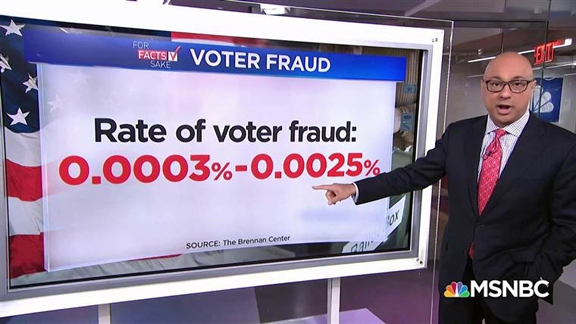 outings, when no strain threatens our budget. It takes little faith to acknowledge God’s goodness when terror remains at a distance. Bring us into the presence of widows whose faith is stronger than famine. Send Elijah to accompany us to the place where hope outstrips horror.” —continue reading “
outings, when no strain threatens our budget. It takes little faith to acknowledge God’s goodness when terror remains at a distance. Bring us into the presence of widows whose faith is stronger than famine. Send Elijah to accompany us to the place where hope outstrips horror.” —continue reading “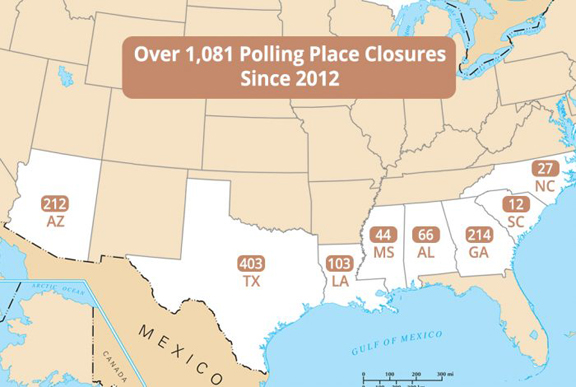 • “It is more likely that an individual will be struck by lightning than he will impersonate another voter at the polls.” —
• “It is more likely that an individual will be struck by lightning than he will impersonate another voter at the polls.” —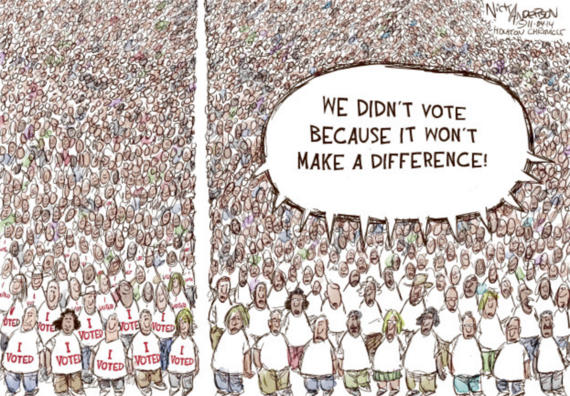
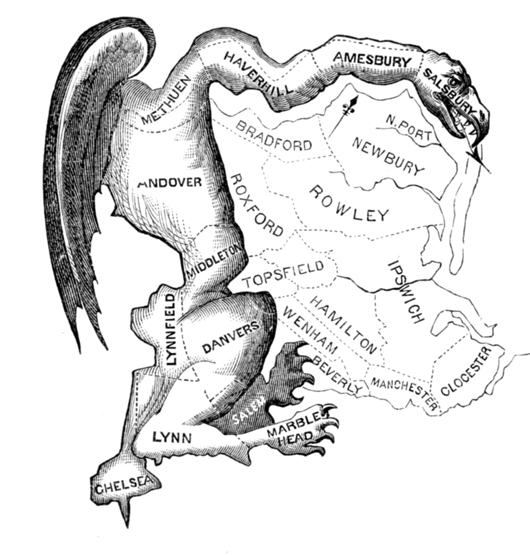 voters, 70% of them African American, under his “exact match” policy.
voters, 70% of them African American, under his “exact match” policy.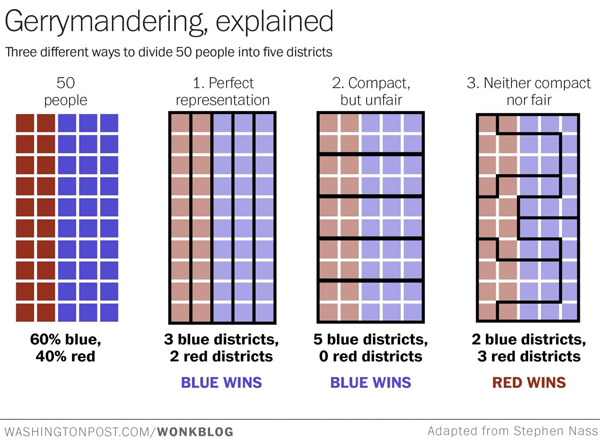
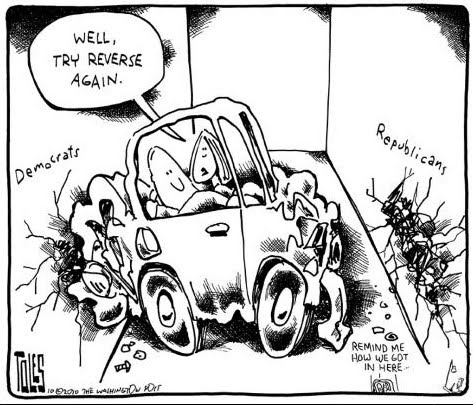 hey Would Have Given Us Candidates.” —Jim Hightower book title
hey Would Have Given Us Candidates.” —Jim Hightower book title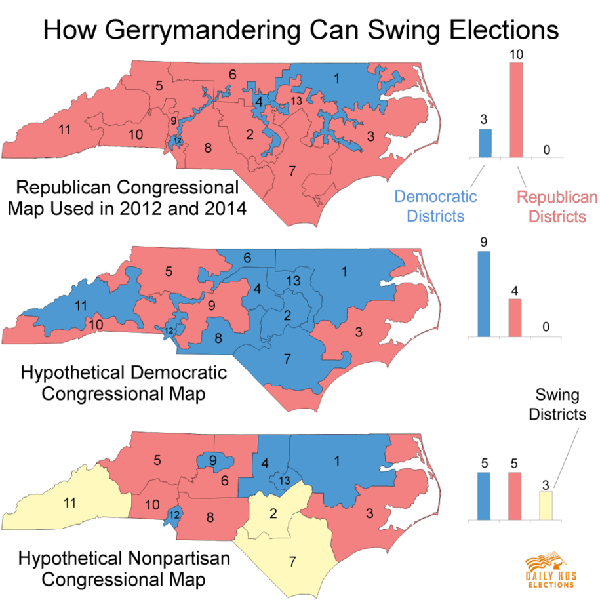 ay that it gets metabolized into acts of love.” —Eugene H. Peterson
ay that it gets metabolized into acts of love.” —Eugene H. Peterson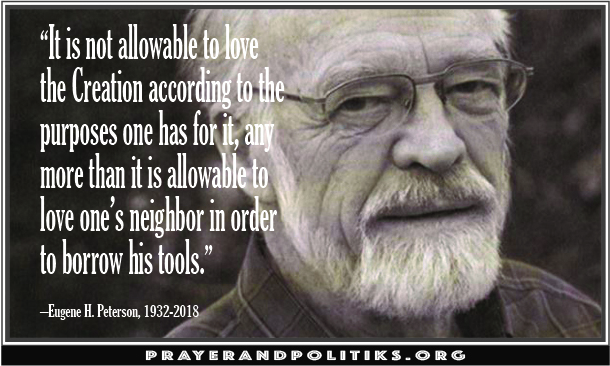 ¶ Just for fun. Amazing
¶ Just for fun. Amazing 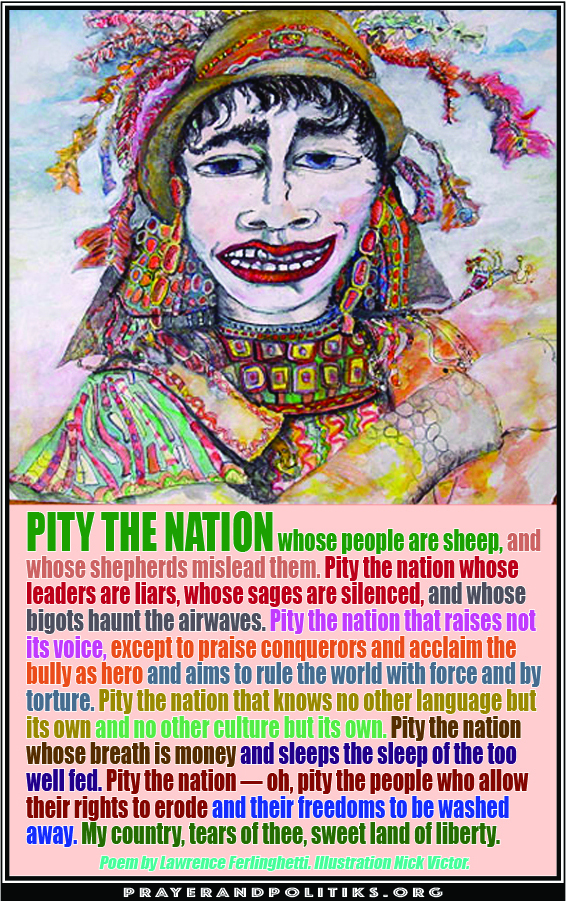
 nothing without a demand.” Be demanding. Justice often requires the painful work of delegitimizing existing power arrangements before reconstruction can occur.
nothing without a demand.” Be demanding. Justice often requires the painful work of delegitimizing existing power arrangements before reconstruction can occur.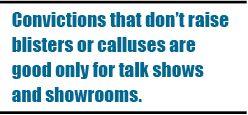 Mead said. “Indeed, it's the only thing that ever has.”
Mead said. “Indeed, it's the only thing that ever has.”
 photographers from behind barbed wire, / who can’t bound down the street in a new pair of sneakers, / who are born in places we wouldn’t be caught dead, who never go to the circus, who live in an X-rated world.” —continue reading Ina J. Hughes’ “
photographers from behind barbed wire, / who can’t bound down the street in a new pair of sneakers, / who are born in places we wouldn’t be caught dead, who never go to the circus, who live in an X-rated world.” —continue reading Ina J. Hughes’ “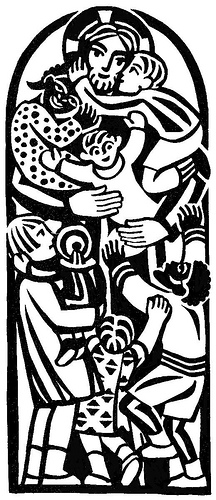 people, three languages in Haifa all singing “
people, three languages in Haifa all singing “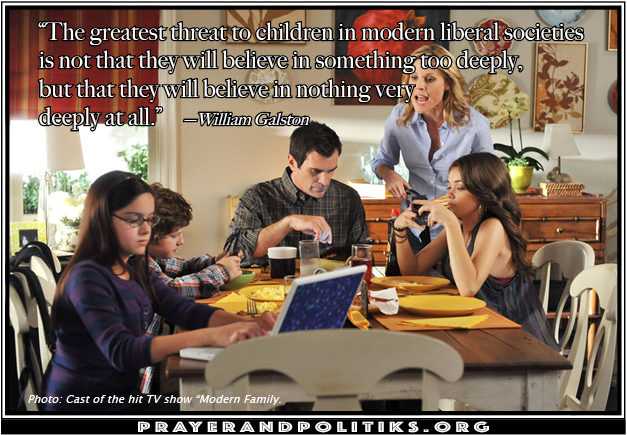 have no power here / I will stand fast.” —Fred Small, “
have no power here / I will stand fast.” —Fred Small, “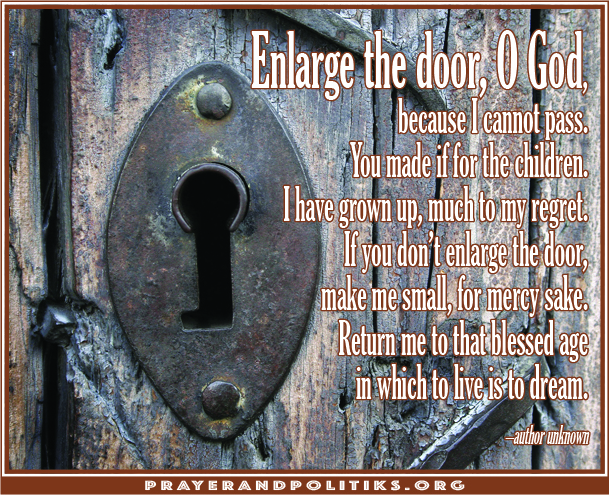 is a cliff and if the children in the play wander too close and fall, he would be there to protect them.” —Mary Lou Kownacki, OSB, The Nonviolent Moment: Spirituality for the 21st Century
is a cliff and if the children in the play wander too close and fall, he would be there to protect them.” —Mary Lou Kownacki, OSB, The Nonviolent Moment: Spirituality for the 21st Century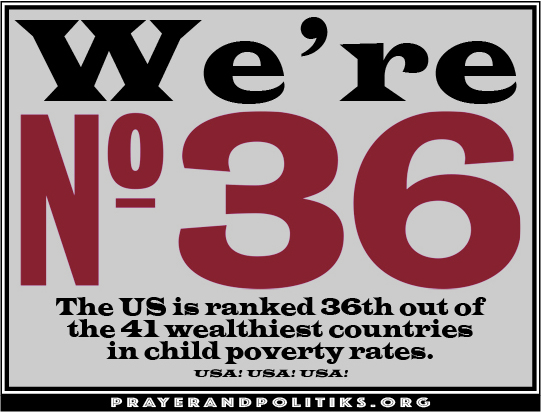 York Times
York Times 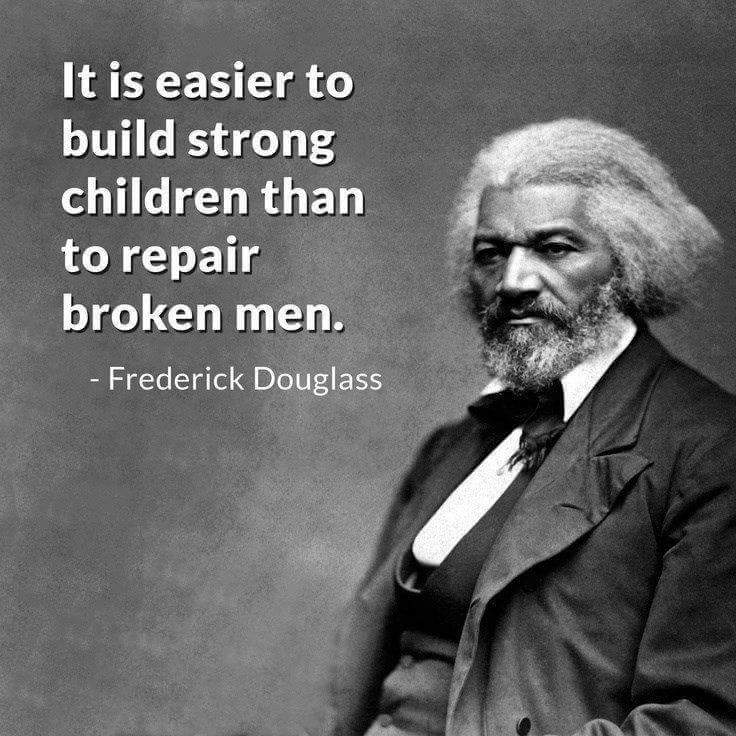 its highest level ever, according to a report by The New York Times. Data obtained by the Times showed that 12,800 children were detained in federal custody this month, compared to 2,400 children detained in May 2017.” —
its highest level ever, according to a report by The New York Times. Data obtained by the Times showed that 12,800 children were detained in federal custody this month, compared to 2,400 children detained in May 2017.” —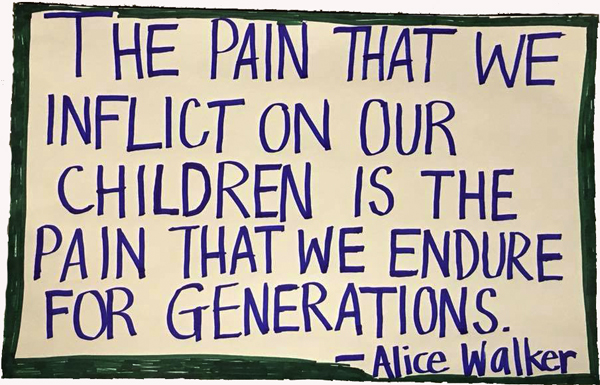 made some huge mistakes / And that’s how we now find ourselves in this tenuous place. / Teach them that hate is the poison. / Teach them that love is the remedy, / That it is better to be readied for what comes next, / Even if the revelation is painful.” —read
made some huge mistakes / And that’s how we now find ourselves in this tenuous place. / Teach them that hate is the poison. / Teach them that love is the remedy, / That it is better to be readied for what comes next, / Even if the revelation is painful.” —read 
 School teacher asked us to read the passages from some of the New Testament letters of Paul (like Colossians 3:5). And then we asked what that word meant and suddenly the teacher’s expression looked like an 18-wheeler was headed right for us.
School teacher asked us to read the passages from some of the New Testament letters of Paul (like Colossians 3:5). And then we asked what that word meant and suddenly the teacher’s expression looked like an 18-wheeler was headed right for us. an 8000-year-old law of God.”
an 8000-year-old law of God.” them.” (Genesis 1: 27) In the second creation story in Genesis (2:24—yes, there are two): "Therefore a man leaves his father and his mother and clings to his woman; and they become one flesh." (Knust translation)
them.” (Genesis 1: 27) In the second creation story in Genesis (2:24—yes, there are two): "Therefore a man leaves his father and his mother and clings to his woman; and they become one flesh." (Knust translation)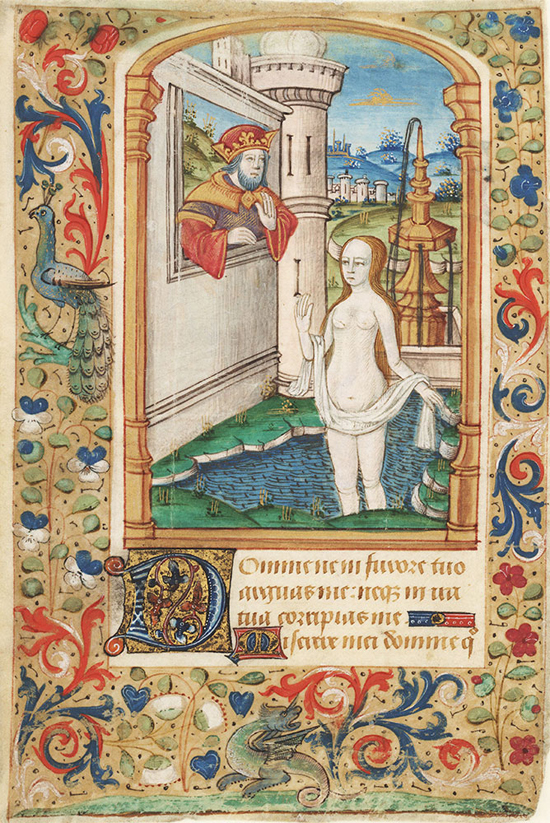 stoned to death in the town square. (Deuteronomy 22: 18-21) Many of us would not be alive today if we still obeyed that law.
stoned to death in the town square. (Deuteronomy 22: 18-21) Many of us would not be alive today if we still obeyed that law.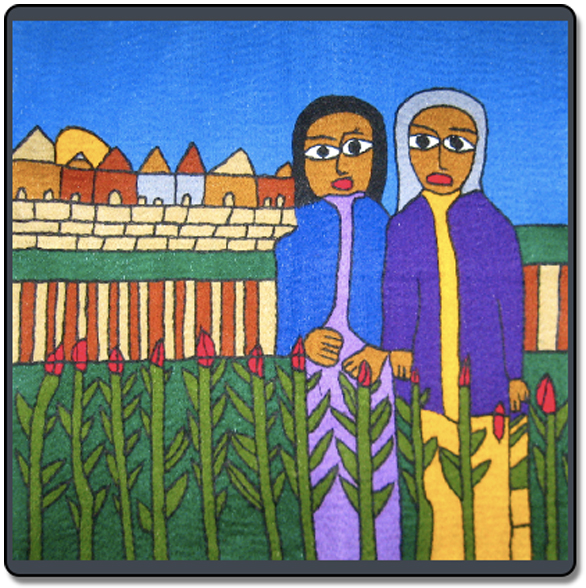 lodge, I will lodge; your people will be my people, and your God my God" (Ruth 1: 16). Those beautiful words were spoken from one widow to another widow. Ruth courageously said them to Naomi as they forged a path in a treacherous and harsh world without husbands.
lodge, I will lodge; your people will be my people, and your God my God" (Ruth 1: 16). Those beautiful words were spoken from one widow to another widow. Ruth courageously said them to Naomi as they forged a path in a treacherous and harsh world without husbands.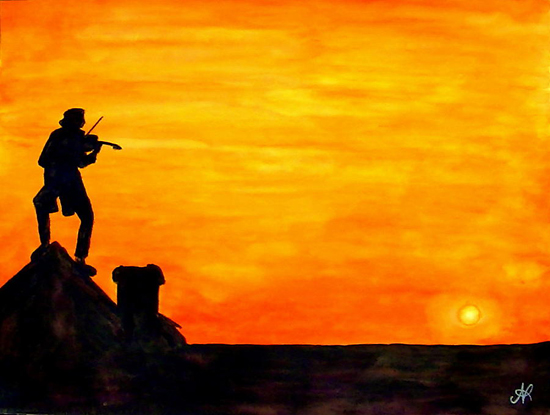 love right now?
love right now?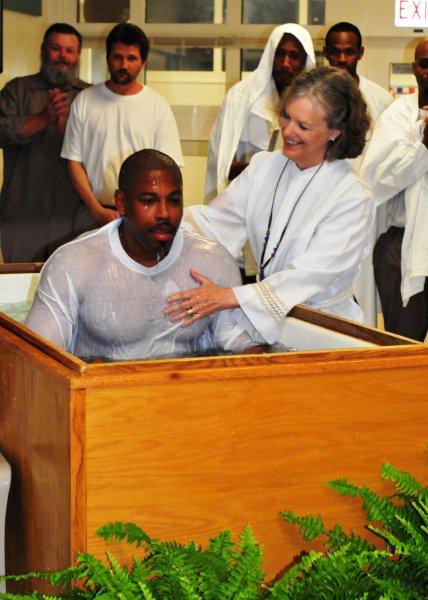 controversy. It was mostly from prisoners who were dismayed about my biblical interpretation or angry because I did not use the 1611 King James version of the Bible. And of course my gender has always been a stumbling block for some of the prisoners.
controversy. It was mostly from prisoners who were dismayed about my biblical interpretation or angry because I did not use the 1611 King James version of the Bible. And of course my gender has always been a stumbling block for some of the prisoners.
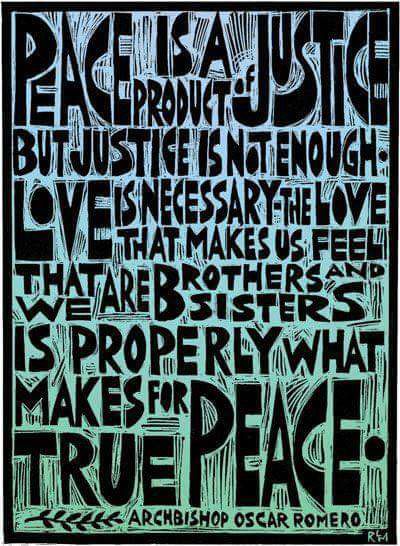 struck down the poor and their defenders.” —Archbishop Vincenzo Paglia, at a Vatican press briefing on Feb. 4, on the eve of his beatification, quoted in
struck down the poor and their defenders.” —Archbishop Vincenzo Paglia, at a Vatican press briefing on Feb. 4, on the eve of his beatification, quoted in 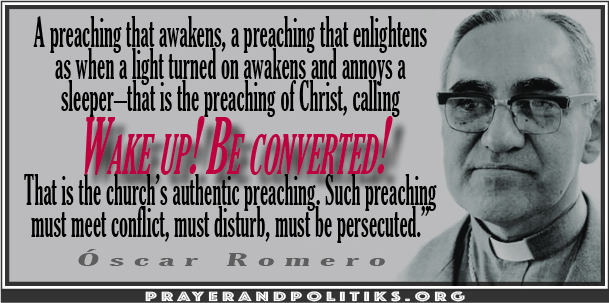 the Truth Concerning Gross Human Rights Violations and for the Dignity of Victims’ in recognition of the role of Archbishop Romero in defence of human rights. Romero actively denounced violations of the human rights of the most vulnerable people and defended the principles of protecting lives, promoting human dignity and opposition to all forms of violence.” —“
the Truth Concerning Gross Human Rights Violations and for the Dignity of Victims’ in recognition of the role of Archbishop Romero in defence of human rights. Romero actively denounced violations of the human rights of the most vulnerable people and defended the principles of protecting lives, promoting human dignity and opposition to all forms of violence.” —“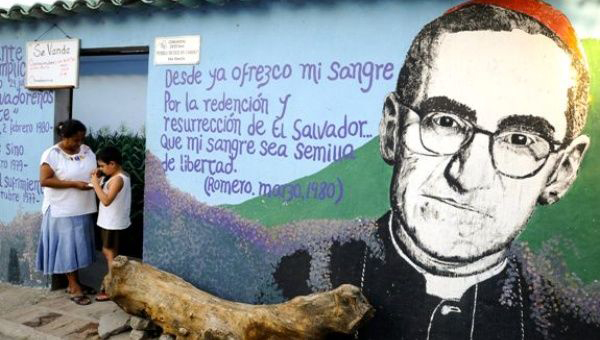 generosity. It is right and it is duty.”
generosity. It is right and it is duty.”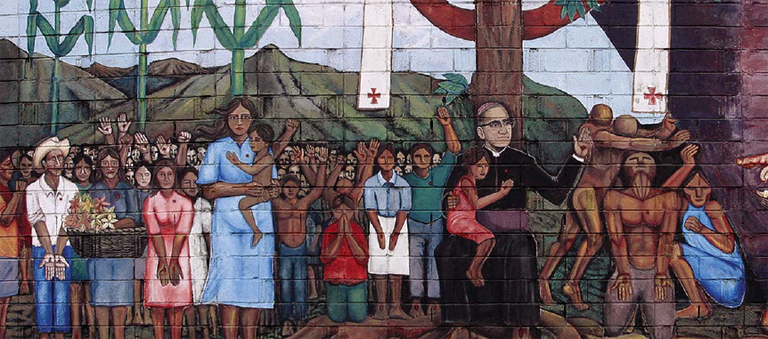
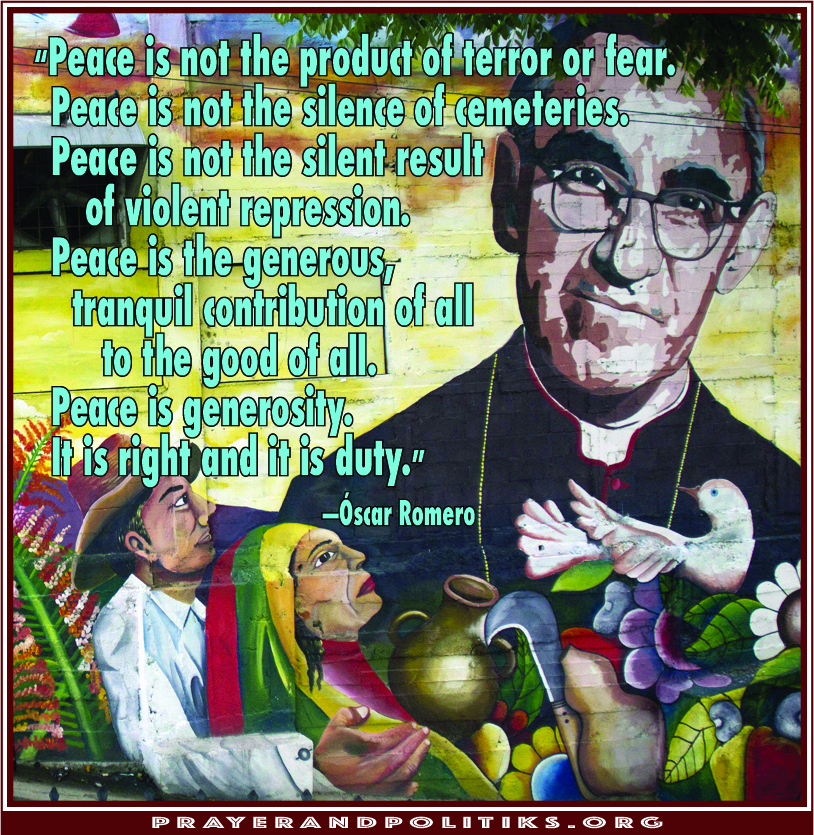 • Archbishop Oscar Romero will be canonized by the Roman Catholic Church on Sunday 14 October. Watch this short (4:17) video summary of his life. —
• Archbishop Oscar Romero will be canonized by the Roman Catholic Church on Sunday 14 October. Watch this short (4:17) video summary of his life. — of pardon will arrive from every far-flung hill and hamlet. Among them will be the shamed and forsaken, the exposed and exploited; the blind and the lame and the laboring women.” —continue reading “
of pardon will arrive from every far-flung hill and hamlet. Among them will be the shamed and forsaken, the exposed and exploited; the blind and the lame and the laboring women.” —continue reading “
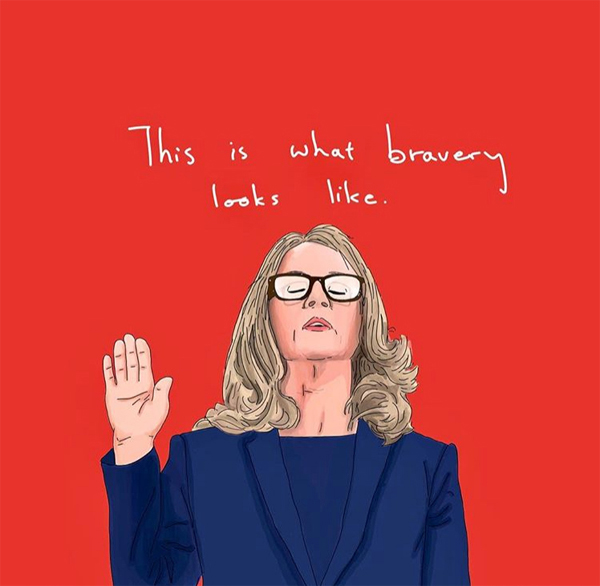 Psalm 104
Psalm 104 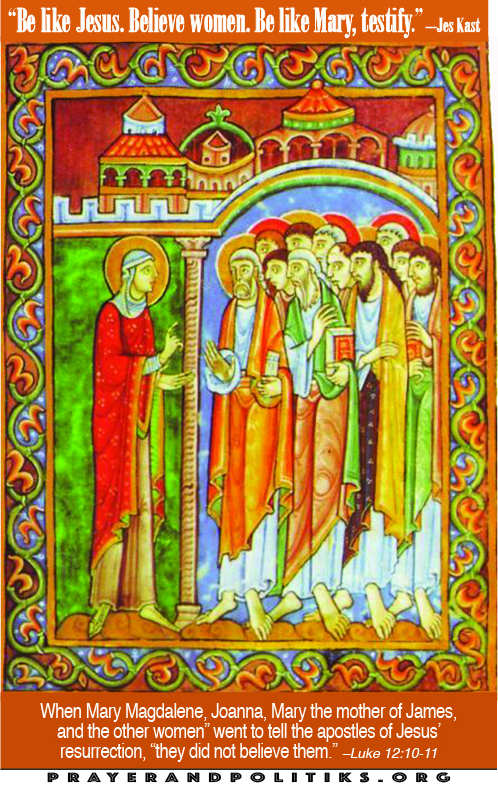 riarchy, an institution that is thousands of years old. The test of our success is in the remarkable legal and cultural shifts we have achieved over the past 50 years, not whether or not we have changed everyone and everything in the past year. That we have not changed everything does not diminish that we have changed a lot.” —Rebecca Solnit, “
riarchy, an institution that is thousands of years old. The test of our success is in the remarkable legal and cultural shifts we have achieved over the past 50 years, not whether or not we have changed everyone and everything in the past year. That we have not changed everything does not diminish that we have changed a lot.” —Rebecca Solnit, “ ne economy it is not the feminine person who remains hidden and at home. She is God in the world, moving, stirring up, revealing, interceding. It is she who calls out, sanctifies, and animates the church. Hers is the water of the one baptism. The debt of sin is wiped away by her. She is the life-giver who raises men [sic] from the dead with the life of the coming age. Jesus himself left the earth so that she, the intercessor, might come.” — Jay G. Williams, “Yahweh, Women and the Trinity,” Theology Today 32 (1975) 240.
ne economy it is not the feminine person who remains hidden and at home. She is God in the world, moving, stirring up, revealing, interceding. It is she who calls out, sanctifies, and animates the church. Hers is the water of the one baptism. The debt of sin is wiped away by her. She is the life-giver who raises men [sic] from the dead with the life of the coming age. Jesus himself left the earth so that she, the intercessor, might come.” — Jay G. Williams, “Yahweh, Women and the Trinity,” Theology Today 32 (1975) 240.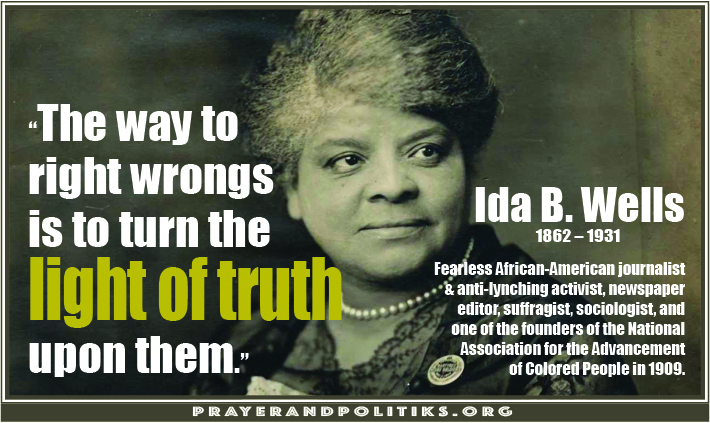 cabulary update: mantrum: when a grown man throws a tantrum; when he can’t have his way. —Urban Dictionary
cabulary update: mantrum: when a grown man throws a tantrum; when he can’t have his way. —Urban Dictionary
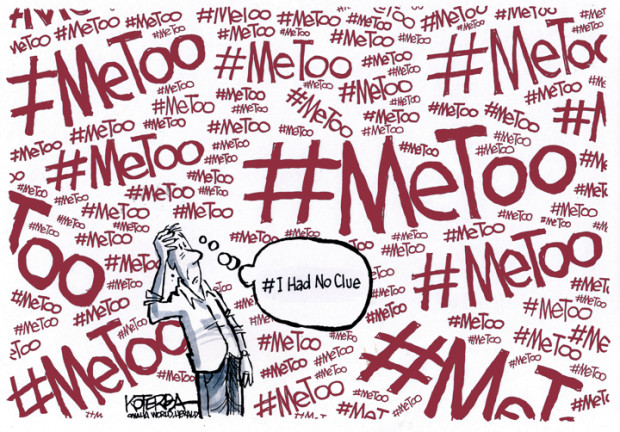 r the beauty of the earth.
r the beauty of the earth.  n / You’ve never owned me, don’t even know me / I’m not invisible, I’m simply wonderful / I feel my heart for the first time racing / I feel alive, I feel so amazing.” —Tena Clark and Tim Heintz, “
n / You’ve never owned me, don’t even know me / I’m not invisible, I’m simply wonderful / I feel my heart for the first time racing / I feel alive, I feel so amazing.” —Tena Clark and Tim Heintz, “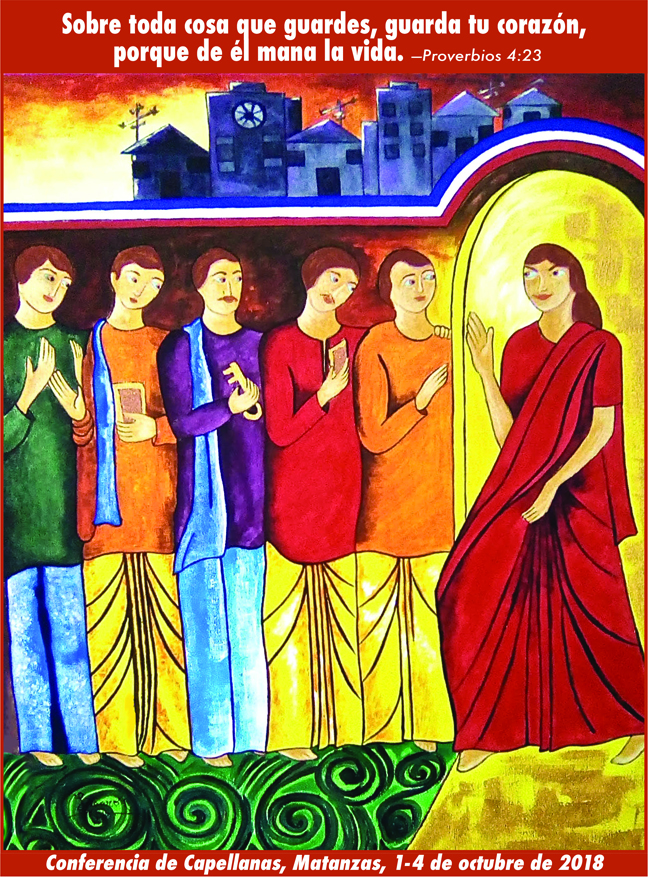 chaplains in Cuba. The text from Proverbs (at top) translates: “Keep your heart with all vigilance, for from it flow the springs of life.” The text resonates with the Gospel of Luke’s account (2:19) where it is said that Mary “treasured all these words in her heart” following the shepherds’ pilgrimage (angels never appear to lowly shepherds in the world as we know it), Zechariah’s hymn (“to guide our feet into the way of peace,” 1:79), and Mary’s own credo, including the seditious lines about the hungry being filled with good things and the rich sent away empty” (1:53).
chaplains in Cuba. The text from Proverbs (at top) translates: “Keep your heart with all vigilance, for from it flow the springs of life.” The text resonates with the Gospel of Luke’s account (2:19) where it is said that Mary “treasured all these words in her heart” following the shepherds’ pilgrimage (angels never appear to lowly shepherds in the world as we know it), Zechariah’s hymn (“to guide our feet into the way of peace,” 1:79), and Mary’s own credo, including the seditious lines about the hungry being filled with good things and the rich sent away empty” (1:53).